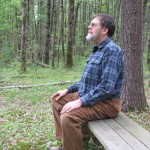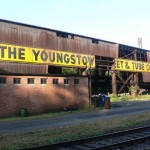I dreamed yesterday morning of the land where I grew up.
The land where I grew up was not a family farm. We’re all allowed to romanticize a family farm. We see something admirable in families trying to maintain ties to the old homestead, when it’s a farm that’s been in the family for generations.
But my home was not on an old home place, just a two acre plot of woodlot, lawn, and garden with a somewhat boxy two story house put up in the sometime between 1920 and 1940, at a guess, with a beautiful oval rock garden, three tall clumps of lilac trees, four apple trees, two pears, and (when I was young) a plum tree. There were hemlocks, swamp maples, one sugar maple, and many towering ash trees standing guard at the edge of the property, along the tumbledown fieldstone wall.
Our house was brown, with a hardwood floor my father put in himself, and kitchen cabinets and formica countertops he put in as well. There was a porch that ran all along the back wall of the house, and even on a winter afternoon, the strong sun through the glassed-in walls could make you feel like it was summer again. There were two abandoned tree forts on the property–one in the woods, which I grew up trying to set right, and another in the giant maple tree that shaded our porch roof in summer, and which my mother warned me never to attempt to reach, as the tree had grown so tall since it had been built that only a circus daredevil could reach it now.
There was a cistern filled with mosquito larvae, and an old artesian well covered with boards which I convinced myself hid Jenny Greenteeth, and which smelled like the aluminum cups my grandmother filled with water for us, which tasted cooler than any other water ever could.
And last night, I dreamed all of that was for sale.
A friend of my family wound up buying it, a woman who had never owned a home before, and I tried to be glad for her. While struggling not to cry, I congratulated her, and reminded myself that the alternative had been someone else buying the place, probably to rip out all the beautiful, mature trees, to flatten the hills, tear out the remaining glacial boulders, and throw up yet another generic McMansion on the hill. The trees would have to go, of course, to open up more of the View–the long, panoramic view of the Pioneer Valley.
I grew up with that view, though screened through the boughs of winter trees, of twinkling lights against a blue horizon. It’s pretty. But it’s not as much a part of the land as the trees were.
As the trees were. Because, of course, when I awoke, I realized that, indeed, my family home has been sold–years ago in fact, and not to a family friend. Strangers bought my home, and leveled it, tore out the lilacs, the ash trees, the apples and maples and roses, and did put up another McMansion, on their new, bare, pristine green lawn.
But it’s not a farm that I’m mourning, so no one particularly cares. I’m no Native American, whose ties to the land can be safely sentimentalized. I’m ordinary, and that plot of land was ordinary, too. It’s just another two acre plot, one that hadn’t been used to its full financial potential, like an investment not tended.
My society has no place in it for loving land, for being in relationship with it. My parents’ child, I had no legal rights to the trees or the stone wall. In fact, after it sold, but before my home was leveled, I snuck onto the land like a thief, to bear away a single stone from the stone wall.
I have it still. I’d have preferred the worked stone step that led to the house, but that would have been too large a theft for me. I’m sure it was tossed aside in some construction dump when everything else came down, that stone where I sat, a child of four, gazing up in wonder at the tall trees overhead.
Mystery has no price tag, and so Mystery has no value. Childhood love has no profit or contract or name, and so childhood love is cheap. We are foolish, rootless people, and we have no homeland and no shame, because we will not see these things, or understand that they are true.
From Between Old and New Moons:
Who’s ParticipatingPlease add this list to your Synchroblog post so that readers can find everyone’s posts.
The Aquila ka Hecate: King and the Land are One
Symbolic Meanings: Symbolic Landscapes of the Norse Mythology
Quaker Pagan Reflections: Gone Away
Executive Pagan: Nature and Me
Manzanita, Redwoods, and Laurel: The Importance of Local Landscapes
The Dance of the Elements: Landscape and Mythology
Pitch 313: Trancendental Experience Out of Doors Opens the Gateway to Magic
Druid’s Apprentice: Landscape Synchroblogging
Paleothea: Ge, Gaia, Gaie: Earth
Mythprint: The Atlantis Legend
Druid Journal: Guest Post Merry Meetings
Between Old and New Moons: Chanting the LandscapeAny omissions are purely a matter of oversight; feel free to add your post to the comments section if you’re participating in the synchroblog, and I’ll get it up here as quick as I can. Comments on Mahud’s post at Between Old and New Moons are being monitored, and I’ll update this links section as often as I can.
Blessed be!















